The prominent Shi'ite Iraqi cleric Muqtada Al-Sadr, leader of the Sadrist movement in Iraq, appears to be attempting to set himself up as a recognized religious authority in Iraq – even though his studies in the holy city of Qom in Iran have not yet qualified him to issue fatwas. His recent tweets appear to be aimed at pleasing Tehran, which follows the doctrine of velayat-e faqih, or rule of the jurisprudent, under which the leader is the custodian of the people.
Empowered by his new status as a leader of the Iraqi resistance factions following his meeting in Iran with commanders of Iraq's Popular Mobilization Units (PMU),[1] Al-Sadr, who has in recent weeks renounced the anti-government protesters, is now condemning them as "animals pursing their lust." He seems to be challenging the Shi'ite religious establishment as represented by Iraqi Grand Ayatollah Ali Al-Sistani.
The following report will examine Al-Sadr's recent tweets, which signal his effort to garner support from Iran and from his remaining supporters among the poor sectors of the Iraqi Shi'ite community, and to position himself as guardian of Islamic values in Iraq.
Al-Sadr's Calls For Gender Segregation In Protests
On February 9, Al-Sadr tweeted his 18 points for demonstrators to abide by during their ongoing anti-government protests. One was that demonstrators "must observe the legal and social rules of the country as much as possible" and that there should be no mixing of the genders at the sit-in tents.[2]
Al-Sadr affiliate Mohammad Saleh Al-Iraqi tweeted on February 10 a list of reasons why women and men should not protest together, in part because some female protesters do not wear the hijab and the protests have become an opportunity for "debauchery."[3]
"Iraq Will Not Be A Chicago Of Immorality And Homosexuality"
On February 13, Al-Sadr double downed on his earlier call for gender-segregation tweeting a lengthy statement in which he warned: "I advise that group of deviants, the ISIS of liberalism and urbanization, not to follow their animal instincts and immoral lust. Otherwise, we will not stay silent about their offenses against religion, faith, and the homeland."[4]
He further said that he "will not allow Iraq to become a Kandahar of religious extremists, nor a Chicago of immorality and homosexuality." His statement is a reference to a slogan from Iraqi protests years ago, when demonstrators chanted "Baghdad will not become Kandahar, we want Baghdad to be Chicago."
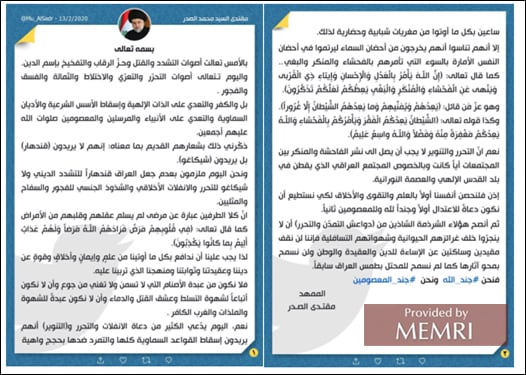
Al-Sadr's February 13, 2020 tweet
SUPPORT OUR WORK

Al-Sistani's Affiliates Respond
On February 10, representatives of Ayatollah Ali Al-Sistani in Karbala, Iraq highlighted in their prayer guidance, which often follows the sunset prayer, the role of the Prophet Muhammad's daughter Faṭimah Al-Zahra in supporting her father. This move was seen by protesters as a tactful response by Sistani to Al-Sadr's call for gender segregation in protests and sit-ins.[5]
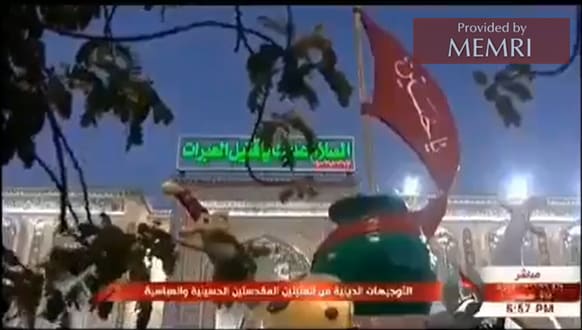
Still image from video of prayer guidance by Sistani's representative in Karbala highlighting the "significant role of Faṭimah Al-Zahra in supporting her father the Prophet Muhammad in battles."
Furthermore, the Al-A'taba Al-Hussainyia website, which publishes news and information about activities and events related to the shrine of Imam Hussein in Karbala and to Shi'ites, posted in its women's section a photo of an Iraqi woman artist painting a mural depicting protesters in Tahrir Square in Baghdad, with a woman waving an Iraqi flag leading them. The photo was captioned with a nationalist poem praising the Iraqis' devotion to their homeland.[6] The website is sponsored by Al-Sistani's Al-Kafeel International Network.
This is not the first time that Al-Sistani has used his media affiliates to counter Al-Sadr. On January 15, the Al-A'taba Al-Abassyia website re-published Al-Sistani's December 6, 2019 statement strongly warning about "those who seek to exploit the protests calling for reforms in order to achieve certain goals that will hurt the utmost interests of the Iraqi people, and that are not in line with their true values."[7]
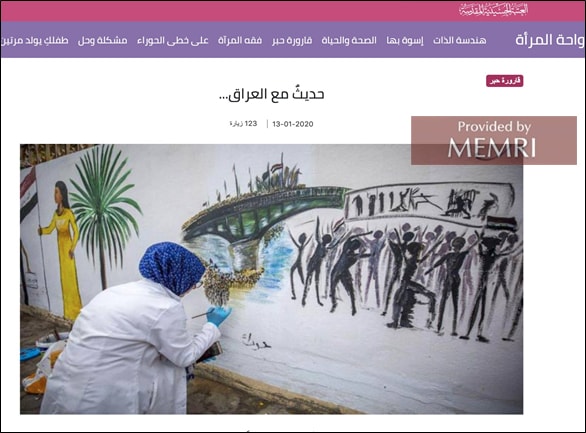
Photo on the Al-Sistani-sponsored Al-A'taba Al-Hussainyia website. (Source: Imamhussain.org)
Pushback On Social Media
On social media, users shared photos of Saba Al-Sadr, granddaughter of Lebanese Shia cleric Mousa Al-Sadr and a distant cousin of Muqtada Al-Sadr, protesting recently in Beirut with her head uncovered, and suggesting that he should first make sure his instructions were being followed in his own family before forcing them on Iraqi women.
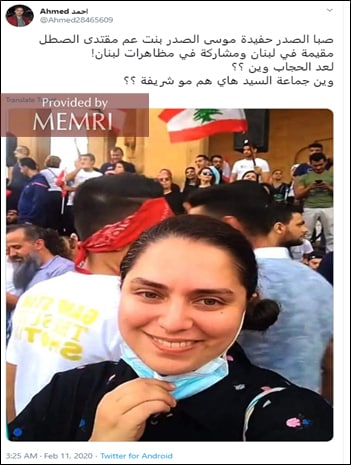
An Iraqi Twitter user tweeted: "Saba Al-Sadr, cousin of Muqtada and granddaughter of Mousa Al-Sadr protesting in Lebanon without hijab!"
In defiance of Al-Sadr's instructions, a massive women-only demonstration was held in Baghdad and other major cities in southern Iraq on February 13. Social media posts called on women to participate to assert the role of Iraqi women in political and social life.
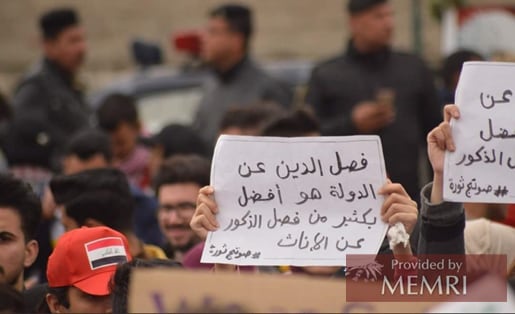
A banner held by an Iraqi woman reads: "Separating religion from state is much better than separating men from women. Your [i.e. women's] voice is revolution."
[1] See MEMRI Special Dispatch No. 8496 After Meeting In Iran, Shi'ite Militia Leaders And Cleric Muqtada Al-Sadr Call For One Million Man March To End U.S. Military Presence, January 14, 2020.
[2] Twitter.com/Mu_AlSadr/status/1226119773836238848/photo/1, February 10, 2020.
[3] Ttwitter.com/salih_m_iraqi/status/1226879039249539072, February 10, 2020.
[4] Ttwitter.com/Mu_AlSadr/status/1227875698129481729/photo/2, February 13, 2020.
[5] Twitter.com/AlaaAIRlkabi/status/1226935669966155782, February 12, 2020.
[6] Mamhussain.org, February 13 2020.
[7] See MEMRI Special Dispatch No. 8497 Grand Ayatollah Ali Al-Sistani Counters Muqtada Al-Sadr's Call For Anti-U.S. March, Warns Against 'Those Seeking To Exploit Protests To Achieve Certain Goals', January 15 2020.
Twitter.com/Mu_AlSadr/status/1226119773836238848/photo/1, February 13, 2020.




